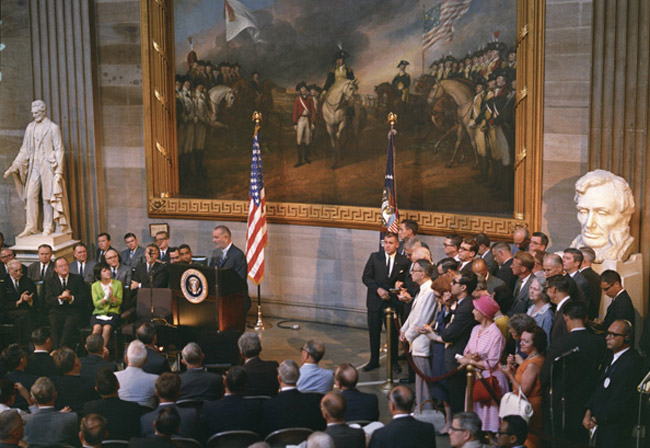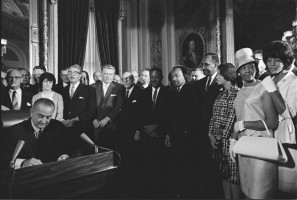
Congress passed the Voting Rights Act in 1965 when blacks were kept from voting through poll taxes or literacy tests, “an insidious and pervasive evil which had been perpetuated in certain parts of our country through unremitting and ingenious defiance of the Constitution,” the U.S. Supreme Court wrote in a 1966 case upholding the act. The act was to be in effect five years, or for as long as Congress considered discrimination to be an issue. It’s been renewed several times since, the last time in 2006, when it was renewed for 25 years by overwhelming votes in both chambers of Congress.
On Tuesday, the Supreme Court, in a 5-4 decision, declared two key parts of the act invalid. The act isn’t voided. But Congress must rewrite the formula that determines which areas of the country must seek federal approval before enacting changes to their election rules. The case focused on Sections 4 and 5 of the act, which require that “pre-clearance” process and specify how it is to be applied.
“There is no valid reason to insulate the coverage formula from review merely because it was previously enacted
40 years ago,” Chief Justice John Roberts wrote in his majority opinion. “If Congress had started from scratch in 2006, it plainly could not have enacted the present coverage formula. It would have been irrational for Congress to distinguish between States in such a fundamental way based on 40-year-old data, when today’s statistics tell an entirely different story. And it would have been irrational to base coverage on the use of voting tests 40 years ago, when such tests have been illegal since that time. But that is exactly what Congress has done.” He concluded: “Our decision in no way affects the permanent, nationwide ban on racial discrimination in voting found in §2,” “We issue no holding on §5 itself, only on the coverage formula. Congress may draft another formula based on current conditions.”
Roberts was joined by the conservative wing of the court: Antonin Scalia, Clarence Thomas, Anthony Kennedy and Samuel Alito. The four liberal justices dissented: Stephen Breyer, Ruth Bader Ginsburg, Elena Kagan and Sonya Sotomayor.

The House of Representatives renewed the Voting Rights Act in 2006 by a 390-33 vote in the House (in July 2006), and by 98-0 in the Senate. Conservative justices have frequently spoken disdainfully of “activist” judges who go against the will of legislatures and Congress. There was no question on Tuesday who were the activist judges.
“The law,” the Washington Post reported at the time of its 2006 renewal, “retains near-iconic status in civil rights circles, even though some elected officials say it is no longer needed. GOP leaders were eager to renew it before the November elections. Unlike the House, where some Southern Republicans opposed provisions that focus on their states, the Senate passed the bill unanimously after hours of one-sided debate in which member after member praised leaders of the 1960s desegregation movement.”
![]()
Download US Supreme Court’s 5-4 Voting Rights Act Decision






























A.S.F. says
Shout out to all those tea-partiers who like to whine, at the drop of a hat, about how THEY are discriminated against, everytime action is taken to ensure that the rights of others of ALL our citizens protected: This is precisely why we must remain on guard and not let our most most vital institutions fall victim to partisanship, cynicism and self-interest. The Supreme Court, in particular, should be held to a higher standard. And we must be vocal in demanding that they are.
Ayn Rand's Spleen says
Right, because congress should have the last say on things. You remember when Obama asked congress to close all of those insider trading loopholes, you know, the ones that allowed members of congress to trade stocks freely regardless of whether or not they might be sitting on a committee that could crush or elevate something that they had a vested interest in? Well they did, and then they very quietly repealed the part that requires them to report things. So pardon me if I don’t care if the supreme court undoes what overprivileged, rich, ivy-league douchebags do.
Magnolia says
The way I read it is that Congress is on the hook and must now “identify those jurisdictions to be singled out on a basis that makes sense in light of current conditions. It cannot rely simply on the past,” Chief Justice John G. Roberts Jr. wrote for the majority.”
They’re not saying voter problems don’t exist; they’re saying that you can no longer judge communities who had problems decades ago. The tools are still in place; the formula must be rewritten to reflect today’s conditions.
A.S.F. says
Considering how quickly states like North Carolina are jumping on the bandwagon to take advantage of this latest ruling, I hardly think this indicates that the problem of voter supression is a remnant of the past. Unfortunately, in some jurisdictions and states, this problem is alive and well and ready to resurrect itself–quite openly now, thanks to the Supreme Court. Now we can all waste more money, time and effort having to take those, who would take advantage of this latest ruling, to court. Prejudice and greed, unfortunately, are human failings that never die–you can only be alert to their effects and do what you can to control them.
Prescient33 says
Civics 101: The United States Constitution, in its 1st three Articles, establishes three separate but equal branches of the government of our Republic, and, as a result, none is subservient to the other. The writer’s headline is plain wrong when it screams “* * * A Fractured Supreme Court Defies a Near Unanimous Congress.” The Court has exercised its constitutionally permitted prerogative in overturning a flawed section of a piece of legislation by a decision of its duly constituted majority, and this can by no means be declared an act of defiance, since it owes no fealty to Congress under our Constitution.
notasenior says
You must have loved the Dred Scott decision too
Sherry Epley says
Good luck with this Congress of ” nothing but obstruction” creating a correct/accurate definition for anything!
Magnolia says
They don’t need to….Obama can simply decree how it shall be, the way he does everything else. We have no checks and balances anymore. And nobody gives a damn.
A.S.F. says
So says that group of Tea party “patriots” who cannot abide the thought that their entitiled and (to them) comfortable world of “I have this much and you get that much” might change in someone else’s favor besides their own. Your “Father Knows Best” daydream of America that never existed in the first place is over. Grow up and get over it. Put on your big girl panties and make room for somebody else at the table who doesn’t look exactly like you.